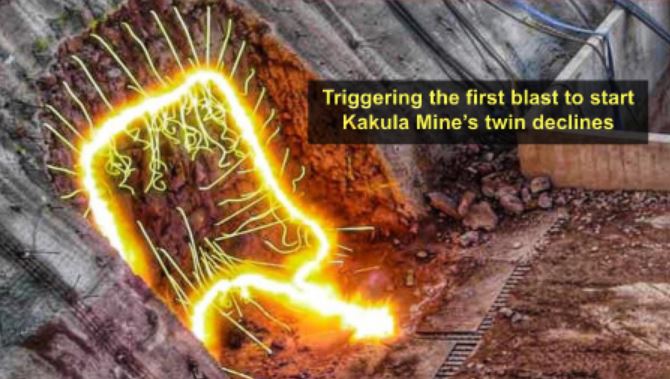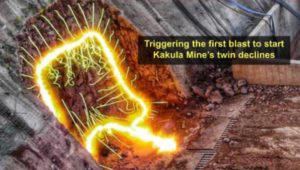DRC miners express willingness to negotiate

Ignition of the detonating cord for the first blast marked the start of development of the twin declines to access the ultra-high-grade Kakula copper discovery on the Ivanhoe Mines Tier One Kamoa-Kakula Copper Project in the DRC. Source: Ivanhoe Mines Ltd.
A legal and technical team representing the major mining companies operating in the Democratic Republic of Congo has arrived in Kinshasa for talks with the government on its new mining code, Randgold Resources Ltd. [GOLD-NASDAQ, LSE] said in a press release.

The move comes just days after DRC President Joseph Kabila signed into law a new mining code that raises royalties and taxes on mining operations, while removing a stability clause in the current law that has been protecting miners from changes to the fiscal and customs regime for 10 years.
Mining industry sources said the biggest concern was a possible 50% tax on so-called super-profits, which are defined as income that is realized when commodity prices rise 25% above levels included in a mining project’s bankable feasibility study.
The press release was issued on behalf of Randgold, AngloGold Ashanti Ltd. [AU-NYSE, AGG-ASX, ANG-JSE], Glencore PLC, Ivanhoe Mines Ltd. [IVN-TSX, IVPAF-OTC], Gold Mountain International/Zijin Mining Group, MMG (PTY) Ltd. and China Molybdenum Co. Ltd.
This follows the meeting on March 7, 2018 where Kabila gave an assurance that the questions raised by the industry would be resolved through transitional arrangements, mining regulations and agreements and guarantees that need to be considered after the new code was signed into law.
In the meeting, the parties were requested to meet for a 30-day period, starting March 14, Rangold said.
As agreed with the DRC President, a matrix of the industry’s issues as well as proposals regarding the mining code have been delivered to the Minister of Mines. The companies are now awaiting an appointment with the Minister to discuss a program of engagement with the government’s working group.
The companies in their meeting with Kabila confirmed their willingness to negotiate additional royalties and changes to other taxes as part of this process.
The companies said they expected the process will start soon and that it would give priority to the recognition of the stability clauses contained in Article 276 of the 2002 mining code and certain mining conventions. Most notably, Article 276 provided for 10 years of stability after changes are made to the mining code, and formed the basis of many investment decisions in the DRC.
This period of stability resulted in over US$10 billion in direct investments by the mining industry, which created over 20,000 full time jobs in the DRC.
Meanwhile Randgold Resources’ and AngloGold Ashanti’s Kibali Mine, Glencore’s Mutanda Mine and Kamoto Copper Company, the Kamoa-Kakulu Mine, MMG’s KInsevere Mine and CMOC’s Tenke Fungurume Mine have resigned from the FEC, the Congolese Chamber of Commerce with immediate effect.
These mines, which represent more than 85% of the DRC’s copper, cobalt and gold production, said the FEC does not adequately represent their interests.
